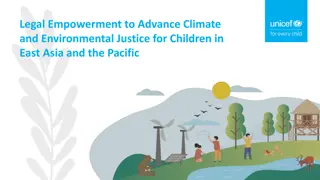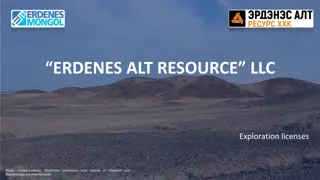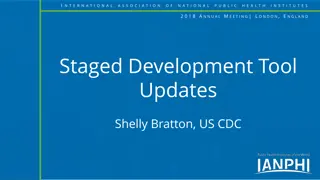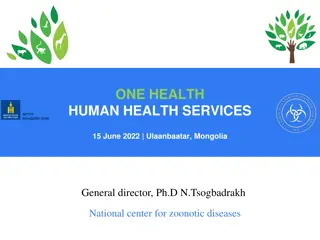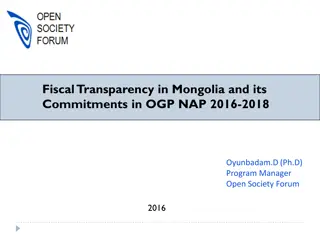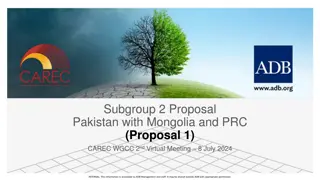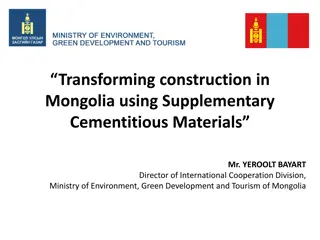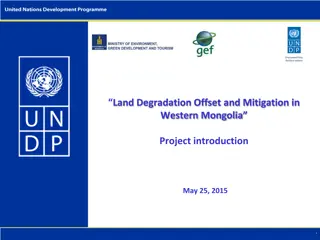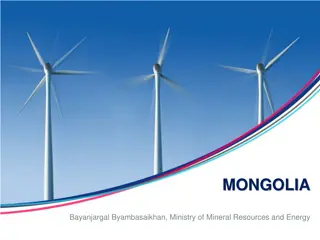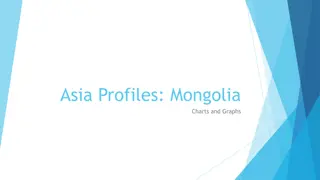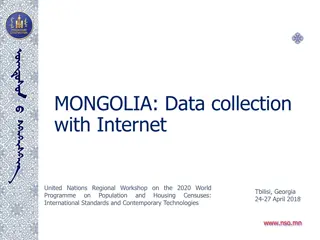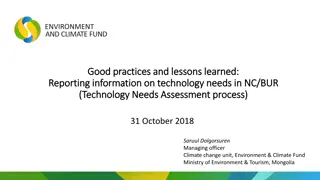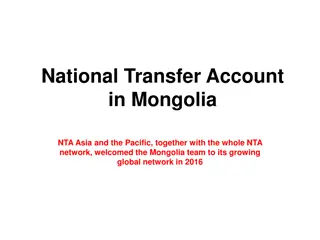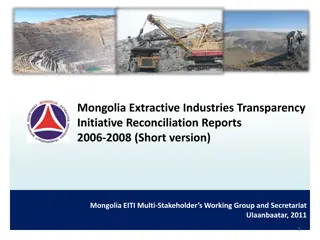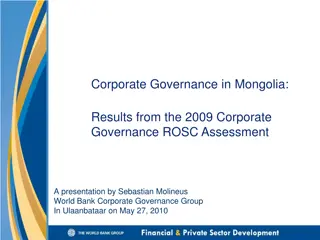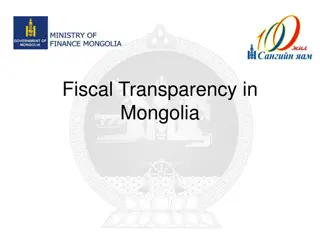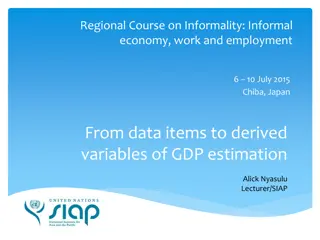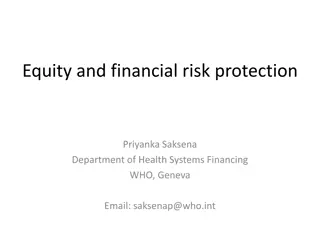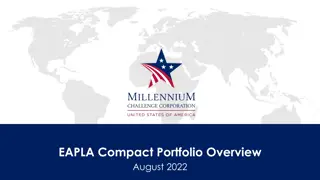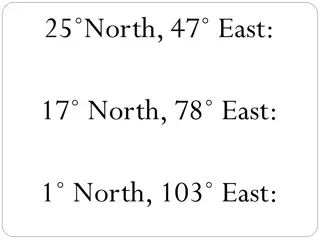SUSTAINABLE WATER USE FOR GREEN HYDROGEN PRODUCTION: PRELIMINARY INSIGHTS FROM OECD WORK IN MONGOLIA
Preliminary insights from OECD work in Mongolia discuss the impact of green hydrogen production on water, sustainable approaches, and possible ways forward. The Sustainable Infrastructure Programme in Asia supports the transition towards net-zero infrastructure with a focus on enabling policies, pla
0 views • 14 slides
Legal Empowerment Advancing Climate and Environmental Justice for Children in East Asia-Pacific
Legal empowerment empowers children to uphold their rights to a healthy environment and safe climate through legal and non-legal actions. Projects in East Asia-Pacific focus on case studies, workshops, and guidance to advance climate and environmental justice, including initiatives in Australia, Ind
0 views • 9 slides
Exploration Licenses in Mongolia: ERDENES.ALT.RESOURCE.LLC Projects Overview
ERDENES.ALT.RESOURCE.LLC holds exploration licenses for projects in Mongolia, specifically the Mukhar Khar Tolgoi licensed exploration area. This area shows potential for porphyry deposits based on geochemical factors, with drilling research indicating anomalous metal contents. The company has compl
1 views • 10 slides
Enhancing Evaluation Capabilities in Mongolia for Agenda 2030
The Mongolian Evaluation Network in collaboration with UNDP is working to integrate the 2030 Agenda into national strategies and plans, establish institutional coordination mechanisms, align budgets, and enhance data monitoring systems. Key stakeholders including government agencies, NGOs, and inter
0 views • 9 slides
Staged Development Tool for National Public Health Institutes
The Staged Development Tool (SDT) is a facilitated self-assessment process designed to assist National Public Health Institutes (NPHIs) in assessing capacities, identifying gaps, and developing actionable plans. It supports planning and prioritization in NPHIs across various countries, including Gui
0 views • 5 slides
Zoonotic Diseases in Mongolia: A One Health Perspective
High risk of zoonosis in Mongolia is evident due to various factors such as livestock practices, wildlife diseases, and environmental changes. The National Center for Zoonotic Diseases in Mongolia plays a crucial role in studying, preventing, and raising awareness about over 160 zoonotic infectious
0 views • 13 slides
Fiscal Transparency in Mongolia: OGP NAP 2016-2018 Commitments
Explore the assessment of fiscal transparency in Mongolia and its commitments in the Open Government Partnership National Action Plan (2016-2018). The content includes results of the Open Budget Survey, Subnational Budget Transparency Survey, recommendations, and evaluations of budget transparency a
0 views • 19 slides
Regional Project Proposal to Enhance Climate Resilience in Pakistan, Mongolia, and PRC
This proposal outlines a regional project focusing on enhancing climate resilience and agricultural productivity in Pakistan, Mongolia, and the People's Republic of China (PRC). The project aims to increase access to credit for smallholder farmers, promote climate-smart agriculture technologies, and
0 views • 12 slides
Exploring String Instruments from Around the World
Delve into the enchanting world of string instruments from different cultures. Discover the Erhu from China, with its 4,000-year history and unique playing style. Explore the Morin Khuur from Mongolia, known for its horse-head design and pairing with throat singing. Journey to Pakistan to learn abou
0 views • 14 slides
Agriculture and Crop Production in Mongolia: A Comprehensive Overview
Mongolia's agricultural landscape, focused on livestock until 1959, has evolved to include crop production industries aimed at meeting domestic demand and increasing output. With three cultivation campaigns implemented by the government, a diverse range of crops is cultivated by thousands of farmers
0 views • 38 slides
Poverty Statistics in Mongolia: Current Trends and Challenges
Official statistics on poverty in Mongolia from the National Statistics Office covering methodology, trends, multidimensional aspects, and challenges faced in data collection and monitoring. The data highlights the need for cooperation, funding, and improved statistical capacities to address poverty
0 views • 11 slides
Revolutionizing Construction in Mongolia through Sustainable Cement Solutions
Innovatively transforming Mongolia's construction sector by integrating supplementary cementitious materials (SCM) to reduce carbon emissions, with a focus on recycling fly ash from coal-fired power plants. The National Action Programme on Climate Change (NAPCC) aligns with the project, aiming to mi
0 views • 5 slides
Land Degradation Offset and Mitigation in Western Mongolia Project Overview
This project in Western Mongolia aims to address land degradation issues caused by mining activities by implementing offsetting principles, supporting pasture restoration, and enhancing biodiversity conservation. With a total funding of 6,569,863$, the project targets to conserve ecosystem integrity
0 views • 19 slides
Overview of Wind Energy Sector in Mongolia
Mongolia, guided by renewable energy targets, has made strides in developing its wind energy sector. With operational wind projects and plans for additional capacity, the country aims to meet energy demands and support economic growth through wind power integration.
0 views • 10 slides
Insights into Mongolia: Data Visualizations and Trends
Explore a collection of informative data visualizations and charts highlighting various aspects of Mongolia, including population demographics, economic growth, urbanization, gender gaps in education and labor force, and more. Gain valuable insights into Mongolia's people, culture, and key statistic
0 views • 13 slides
Data Collection with Internet for Censuses in Mongolia
The data collection in Mongolia for censuses has evolved with the implementation of internet-based tools, such as the E-Census and E-Registration systems. These innovations have allowed for more efficient population and housing censuses, including surveys of citizens residing abroad. The aim of thes
0 views • 32 slides
Climate Technology Policies and Initiatives in Mongolia
Mongolia has implemented various climate technology policies and initiatives to address environmental challenges and promote sustainable development. These include laws on technology transfer, innovation, and environmental conservation, as well as national programs focusing on low-carbon economies,
0 views • 10 slides
Developing National Transfer Account in Mongolia: Progress and Challenges
The National Transfer Account (NTA) initiative in Mongolia has made significant strides since joining the global network in 2016. Led by a dedicated research team, the project faces challenges such as data availability, resource limitations, and interlinking findings with policy formulation. To addr
0 views • 5 slides
Overview of Mongolia EITI Reconciliation Reports 2006-2008
Mongolia's Extractive Industries Transparency Initiative (EITI) reconciliation reports from 2006 to 2008 show an increase in the number of reporting companies and a decrease in discrepancies. The reports reveal transparency levels in state budget allocation, taxes, and payments from reconciled compa
0 views • 19 slides
Corporate Governance in Mongolia: Key Insights and Recommendations
This presentation by Sebastian Molineus from the World Bank's Corporate Governance Group in Mongolia highlights the importance of good corporate governance. It defines corporate governance, explores the roles of various stakeholders, and discusses key themes such as enforcement regime, control struc
0 views • 28 slides
Enhancing Fiscal Transparency in Mongolia: Key Developments and Achievements
The fiscal transparency in Mongolia has seen significant progress with the introduction of key laws, initiatives, and reports aimed at ensuring accountability, participation, and effectiveness in budget management. The country's focus on transparency aligns with its vision of promoting public trust
0 views • 16 slides
Understanding Informal Economy and GDP Estimation Methods
This informative content covers a regional course on informality, focusing on the informal economy, work, and employment. It discusses using data items to derive variables for GDP estimation, learning objectives related to GDP questionnaire entries, conceptual foundations of the informal economy, GD
0 views • 11 slides
Financial Risk Protection and Equity in Health Systems
This content discusses measures of financial risk protection in healthcare, including catastrophic health expenditure and impoverishment due to health payments. It highlights data from countries like Laos and Mongolia on household expenditure and factors affecting catastrophic health expenditure. Th
0 views • 15 slides
Compact Development Projects Overview August 2022
The August 2022 overview showcases the status and implementation details of various compact projects in countries like Mongolia, Nepal, Timor-Leste, Kosovo, Indonesia, and Belize. Projects include water sector sustainability, electricity transmission improvements, road maintenance, and water, sanita
0 views • 8 slides
Exploring Cities Around the World Through Coordinates
This content showcases different cities worldwide with their respective coordinates, providing a geographical insight into diverse locations. From Riyadh, Saudi Arabia to Singapore, and Chengdu, China to Novosibirsk, Russia, embark on a virtual journey across continents. Discover the positions of Ul
0 views • 8 slides

